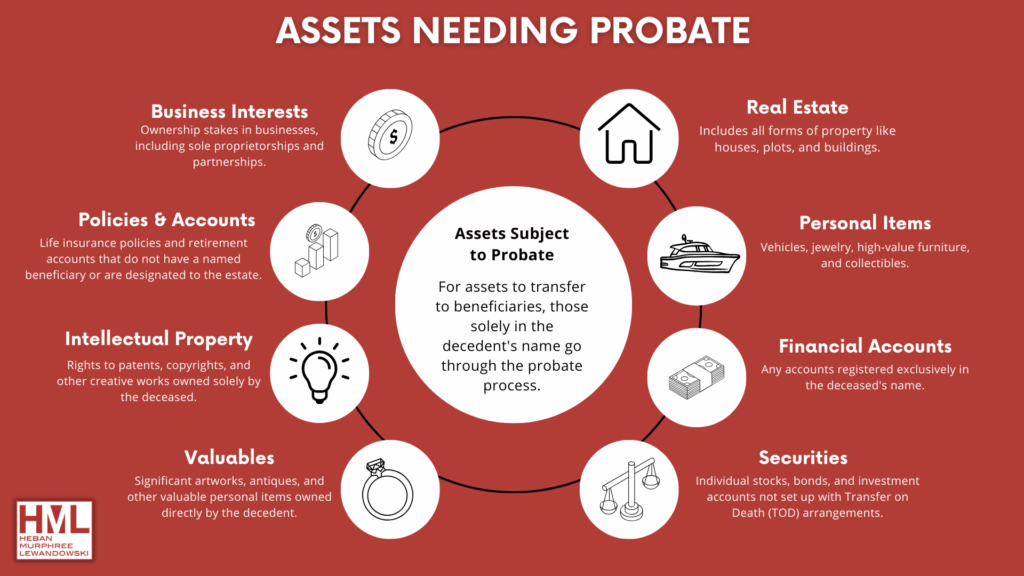- EXPERIENCED LAW FIRM IN TOLEDO, OH
- (419) 662-3100
How Does Probate Work After Death?

An In-Depth Examination of Easements and Property Rights in Ohio
January 3, 2024
Managing Inheritance Conflicts in Ohio
April 19, 2024Ohio’s Probate Process
Probate, often misunderstood and overlooked during estate planning, is decisive in ensuring that the decedent’s assets are properly handled by their wishes and Ohio law.
Heban, Murphree & Lewandowski, LLC, based in Toledo, OH, provides an in-depth look into probate, aiming to clarify its purpose, process, and the importance of proactive estate planning, and what exactly probate is after death.
Defining Probate After Death in Ohio
In Ohio, probate is a court-guided process initiated after an individual’s death to ensure their estate is managed and distributed according to legal standards. This procedure involves authenticating the deceased’s will, if present, taking inventory of all assets, resolving any outstanding debts and taxes, and distributing the remaining estate to the rightful heirs or beneficiaries. The process is designed to transition assets from the decedent’s name to their beneficiaries, ensuring a legal and orderly transfer of ownership.
The probate process starts with the court validating the will and appointing an executor or administrator who catalogs the decedent’s assets and settles financial obligations. This includes paying off creditors and ensuring taxes are filed and paid. Subsequently, according to Ohio’s intestacy laws, the remaining assets are distributed as per the will’s directives or, in the absence of a will.
Ohio’s probate process serves as a critical framework for managing the affairs of the deceased, safeguarding the interests of all parties involved, and ensuring the estate’s distribution is executed fairly and in compliance with the law.
Assets Subject to Probate
The probate process differentiates between assets based on their ownership and designation at death. Assets held solely in the decedent’s name must go through probate before being transferred to beneficiaries.
This comprehensive list includes, but is not limited to:
- Real property (such as homes, land, and other real estate)
- Personal property (including vehicles, jewelry, furniture, and collectibles)
- Bank accounts registered solely in the decedent’s name
- Individual stocks and bonds not part of a transfer-on-death account
- Ownership interests in businesses and partnerships
- Life insurance policies without a designated beneficiary or payable to the estate
- Retirement accounts lacking a named beneficiary or designated to the estate
- Intellectual property rights (such as patents and copyrights) solely owned by the decedent
- Artwork, antiques, and other valuable personal items solely owned
- Safe deposit boxes registered in the decedent’s name
What About Wills and Trusts?
A valid will in Ohio directs the probate court on how the decedent wished their assets to be distributed. It nominates an executor responsible for the estate’s administration, a critical role that includes inventorying assets, settling debts, and managing the distribution of the estate according to the will’s instructions.
In the absence of a will or cases of intestacy, Ohio law dictates the distribution scheme, often not reflecting the decedent’s personal wishes.
Revocable living trusts represent a strategic estate planning tool to avoid probate. By transferring ownership of assets to a trust during their lifetime, an individual can ensure that those assets are managed according to their directives without court intervention upon death.
How It Works In Ohio
The probate process in Ohio is detailed and structured, designed to ensure that the deceased’s estate is managed and resolved according to legal standards.
This process involves several key steps, each crucial for the estate’s proper administration and compliance with Ohio’s probate laws. The steps include:
- Filing of the will and petition in probate court initiates the formal probate process.
- Court appointment of an executor or administrator: The court selects an individual to oversee the estate’s management.
- Notification to heirs and creditors: All potential beneficiaries and creditors are informed about the probate proceedings.
- Asset inventory and valuation: A comprehensive listing and appraisal of the estate’s assets are conducted.
- Settlement of debts and taxes: The estate’s liabilities, including taxes, are paid off.
- Distribution of the remaining assets to the designated heirs: The final step involves transferring the estate’s residual assets to the rightful beneficiaries.
Proactive Estate Planning
Effective estate planning is crucial to simplifying the probate process. Regularly updating wills, designating beneficiaries for all eligible assets, and considering the establishment of a trust are all proactive measures that can significantly impact how an estate is handled after death.
Particularly in Ohio, engaging with knowledgeable legal counsel like HML can ensure that an estate plan is thorough and compliant.
Need Legal Help?
At HML, we are committed to providing Ohio families with the support, expertise, and understanding needed to navigate probate efficiently and with dignity.
For personalized guidance on probate and estate planning in Ohio, contact Heban, Murphree & Lewandowski, LLC. Let our expertise light the way during these complex times, ensuring your peace of mind and the respectful management of your estate.









